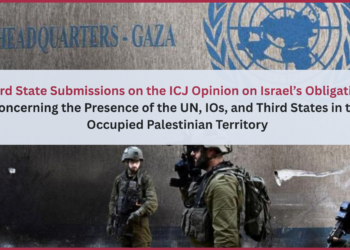New Study by Hasan Basri Bulbul Explores Double Standards in ICC’s Investigations of Palestine and Ukraine
In a new article published in the Journal of Balkan Studies (Volume 5 – Special Issue, June 2025, Pages 49-82), Dr. Hasan Basri Bulbul challenges the International Criminal Court (ICC) by examining claims of double standards in its investigations into the Palestine and Ukraine conflicts. The article, titled “Selective Justice? Empirically Testing for Double Standards in the ICC’s Palestine and Ukraine Investigations,” uses a combination of quantitative and qualitative methodologies to test the consistency of ICC’s prosecutorial practices across two highly sensitive geopolitical cases.
Bulbul’s research focuses on a comparative analysis of ICC actions, scrutinizing how the Court has handled the cases of Palestine and Ukraine. Despite the ICC’s mission to administer universal justice, the study uncovers notable discrepancies in the urgency, resources, and language used in both investigations. By analyzing prosecutorial timelines, resource allocation, field presence, and official communications, Bulbul identifies significant differences in how the Office of the Prosecutor approaches the two cases.
One of the key findings in the study is the stark contrast in prosecutorial urgency and resource deployment between the two investigations. The article reveals that the ICC has shown faster response times, more extensive field presence, and greater resource investment in the Ukraine case compared to Palestine, which raises concerns about potential biases in the application of justice.
Furthermore, the research delves into a discourse analysis of official ICC statements, revealing troubling patterns in the characterization of victims and perpetrators. The study finds that certain linguistic choices systematically disadvantage Palestinian parties, raising questions about the framing of the narrative and whether it reflects the ICC’s neutrality or introduces subtle biases.
These inconsistencies, Bulbul argues, may contribute to a growing perception of a two-tiered justice system within the ICC, undermining its credibility and raising concerns about its impartiality. The article suggests that the issue is more complex than a simple accusation of “double standards.” Rather, it points to significant asymmetries in how justice is administered in different geopolitical contexts, ultimately challenging the Court’s claim to universal impartiality.
As the ICC continues to confront criticism of its selective justice, this empirical study by Hasan Basri Bulbul offers a timely and important examination of its practices. By shedding light on the inconsistencies in prosecutorial actions, the research opens up new avenues for discussions on reforming the Court to ensure greater fairness and consistency in its dealings with international conflicts.
It’s worth noting that two years ago, Law for Palestine published an article titled “One Year for International Law Rising in Ukraine and Falling in Palestine: Beyond the Blame-Game.” This article also addresses the disparities in how international law is applied to different geopolitical conflicts, echoing some of the concerns raised by Bulbul’s research. Furthermore, in March 2024, Law for Palestine submitted a communication to the ICC regarding Israel’s commission of the crime of genocide. On pages 206-216 of the submission, it critically examines the prosecutorial discretion exercised by the ICC’s Office of the Prosecutor, particularly regarding case selection. The submission emphasizes how the criteria guiding this discretion should prioritize investigations into crimes committed in Gaza since October 2023 and urges the prosecution of prominent Israeli perpetrators.
To read the full article, click here





